When we think about the cheeses that truly make us proud to be from Wisconsin, Colby is a name that always rises to the top of the list. An easy-eating table cheese, Colby can make friends with anyone but will especially appeal to those cheese lovers who prefer mild flavor profiles.
On a deeper level, Colby perfectly encapsulates how Wisconsin’s cheesemakers approach their art: respect for tradition balanced with a tireless pursuit of innovation. We hope this guide helps you appreciate this Wisconsin Original as much as we do!
Cheese History: The story behind Colby cheese
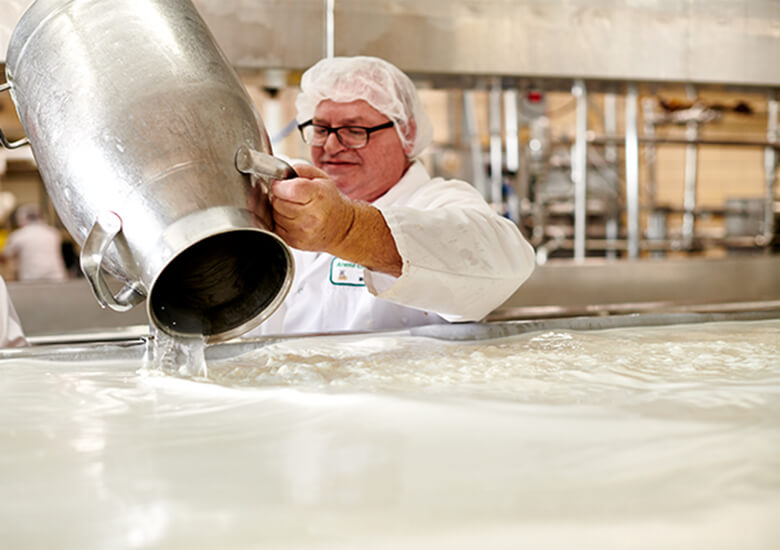
The origin story of Colby takes us back to the year 1875, right outside the city of Colby, Wisconsin. Nestled among acres of farmland and the close-knit communities surrounding Colby, Ambrose Steinwand and his family operated a small cheese factory where they made around 100 pounds of cheese a day—mostly cheddar. Dream job, anyone?
Although 100 pounds of cheese might sound like a lot, modern cheesemakers would consider that a micro-batch. Over the ensuing years, Joseph Steinwand, the family’s eldest child, began helping his father and took a special interest in the intricacies of the cheesemaking process. This passion for cheese blossomed into delicious experimentation, and in 1885, a masterpiece was born. Joseph named it Colby, after his beloved town.
So, what exactly makes Colby special? It all comes down to a few minor changes early in the cheesemaking process that add up to a big difference. Traditionally, cheddar is made by warming and acidifying the milk with starter cultures, adding a substance called rennet to separate curds from the whey, and then draining the whey.
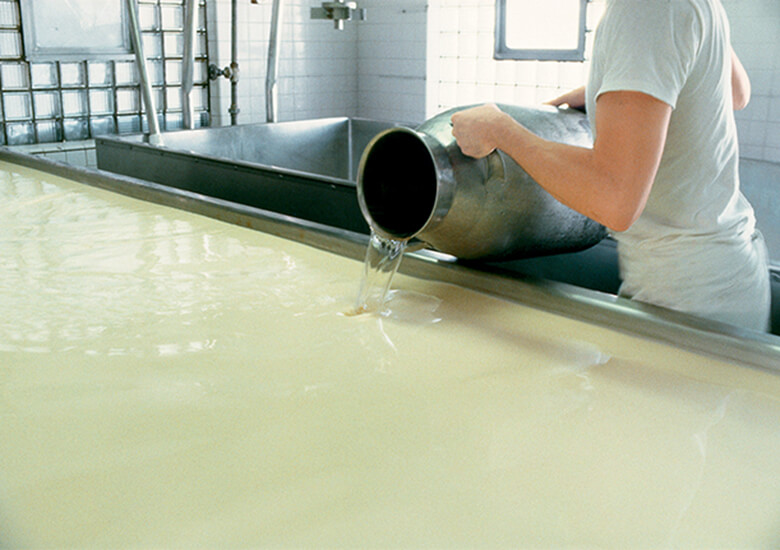
From there, the curds are heated and molded into slabs where they are systematically turned and stacked on each other to remove any excess whey. Joseph did things a little differently. After following the same process of acidifying the milk, adding rennet, Joseph separated the curds from the whey using a stirred curd method. This means the curd is constantly stirred and not separated into slabs. Joseph also added one more new technique, and that was to wash his curds in cold water.
Washing the curd halted the acidification process, which led to a sweeter, more mild style of cheese than traditional cheddar. After washing, he pressed his curds and aged them for just one to three months, a much shorter time period than most cheddars.
In a nutshell, the stirred curd method, the cold-water wash, and the shorter aging process is what makes Colby unique from cheddar.
Today, Wisconsin’s cheesemakers make over 45 million pounds of Colby each year to share with eager cheese lovers across the world.
All about Colby cheese
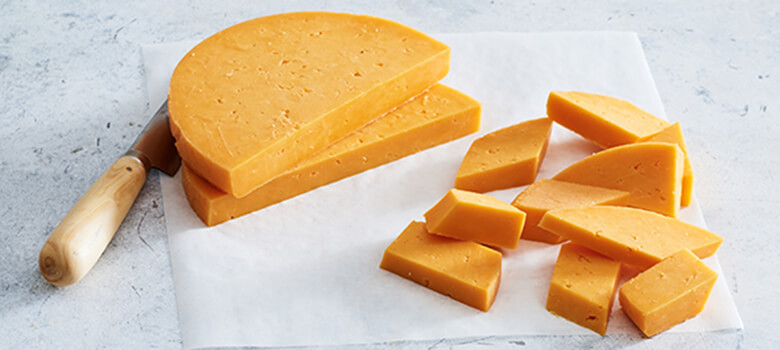
Because there is much to love about Colby cheese, there is also much to learn. Here are answers to a few questions about this favorite Wisconsin Original.
Are there different types of Colby cheese?
Sure are! Colby was traditionally made in long cylinders called ‘longhorns’ and bound in cheesecloth but is now often made in larger formats. Today, Colby’s most famous variant is Colby Jack, but you can also find flavored varieties that feature ingredients like herbs and dried chiles.
Beyond these creative riffs, every cheesemaker has a unique approach to Colby. A Colby from Carr Valley won’t be the same as Hook’s Cheese due to differences like the milk used, subtle changes to the cheesemaking process, and more. Even more reason to try them all!
Must-try Wisconsin Colby Cheeses
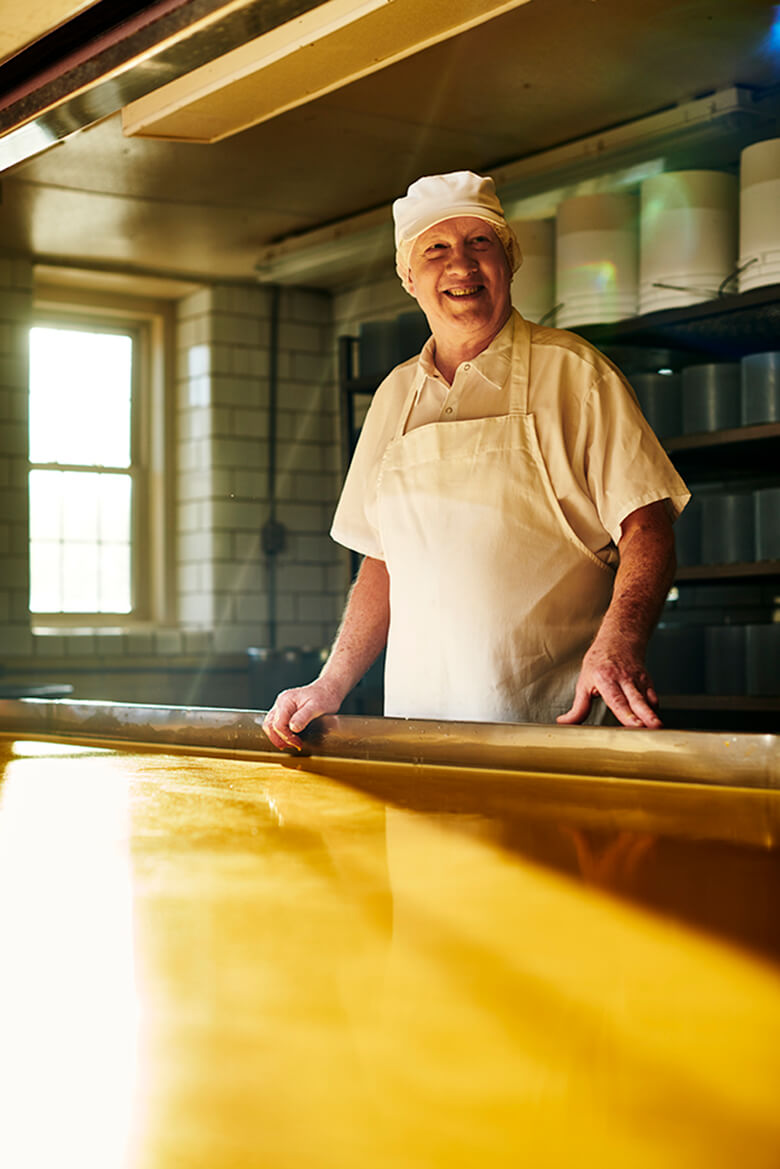
Hook’s Colby: This Colby from Hook’s Cheese Company is part of an elite club of cheeses that have earned the title of World Champion. Hook’s sticks to tradition when it comes to their Colby, and they haven’t changed anything since they won their World Championship title back in 1982—in case there was any question you were tasting the best in the world.
Arena Colby: Crafted by legendary Master Cheesemaker Bill Hanson, Arena Cheese’s Colby is a sterling example of the open texture and mild flavor the classic Colby is known for. This cheese strikes the perfect balance of salty and sweet that only a Wisconsin Colby can.
Carr Valley Colby: Founded back in 1902, Carr Valley Cheese has been making cheese in Wisconsin for over a century, and that experience is on full display with this Colby. Traditional Colby is known for having a curdy texture with mechanical openings (essentially, small holes from trapped whey). Carr Valley has managed to capture this historic technique and scale it into the 21st century for a unique texture that few modern Colby’s still maintain.
Deer Creek’s The Robin: Named after Wisconsin’s state bird, The Robin has a fitting name for this uniquely Wisconsin cheese. This cheese by Deer Creek takes the traditional Colby formula into uncharted territory by bandage wrapping each miniature 12-pound wheel. The result? A lush, buttery cheese that’s flavorful yet subtle.
Does Colby cheese taste like cheddar?
Although the flavor of Colby has many parallels with cheddar, it would be a disservice to describe it as simply a mild cheddar. Colby is a firm cheese that tastes lactic and mild, with a buttery finish. Compared to cheddar, Colby has a more open texture and a sweeter flavor.
Cheesemonger Tip: Want to get the best out of your Colby? Cut it with a serrated knife rather than one with a straight edge to restore the open texture Colby is famous for. This feature can sometimes be lost when Colby is packed for retail.
Pairing Colby Cheese
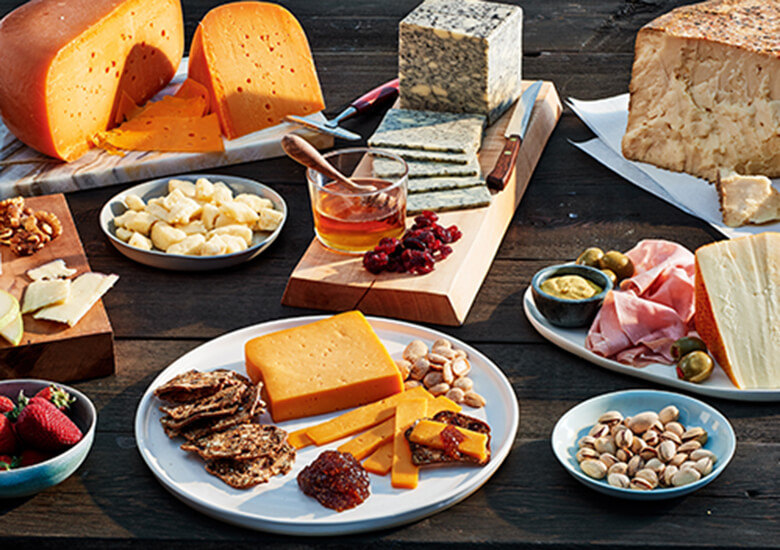
A classic beauty like Colby is happy to stand on its own, but like any Wisconsinite, it enjoys sharing time with good company, too.
What beer goes well with Colby cheese?
For the beer buffs out there, you’ll be happy to know that mild-mannered Colby pairs well with a variety of beers such as pilsners, pale ales, brown ales, and lager. We generally wouldn’t recommend intense beers with ABVs over 10%, as it might overpower some of the more delicate flavors of Colby.
What wine pairs best with Colby cheese?
When pairing wine with Colby we look for fruit-forward reds like Malbec, or pinot noir, or even a cabernet sauvignon. White wines pair even easier due to their lower concentration of tannins. You can’t go wrong with a riesling, sauvignon blanc, or pinot grigio.
What spirits should I have with Colby cheese?
If you prefer the strong stuff, we’d recommend grabbing a good bottle of tequila reposado, rye whiskey, or even a Highland scotch. In general, spirits with tons of smokiness like an Islay scotch should be avoided. These flavors can dominate many of the carefully crafted subtleties of Colby.
If you’re ready to take a deeper look into the world of cheese pairing, we recommend starting with our beginner’s guide to cheese pairing.
Ready to meet an original?
If all this talk of cheese has gotten you hungry for a cheese tasting, you can get Wisconsin’s finest cheeses and cheese gift baskets delivered right to your door with our continuously updated list of cheesemakers and retailers that allow you to order cheese online. Award-winning Wisconsin Cheese is just a click away!
Craving something else? Choose from our selection of over 300 recipes featuring Wisconsin Cheese. Don’t forget to share your creative cheesy creations with us on Facebook and Instagram.
FAQs
What is the difference between Colby cheese and cheddar cheese?
Colby is generally milder, sweeter, and less acidic than a young cheddar. This difference can be traced all the way back to the start of the cheesemaking process, where curds for Colby are rinsed with cold water while cheddar is just separated from the whey with no rinse. Colby isn’t aged for as long as cheddar, which can be aged for 10+ years.
What is Colby cheese good for?
An easy-going and versatile cheese like Colby is good for a multitude of different tasks, from melting over nachos to snacking on alongside the drink of your choice. We love it particularly as a snack with a tart apple or pear.
Is Colby cheese the same as Colby Jack?
Colby and Colby Jack are two distinct cheeses. Colby Jack, or co-jack, is a hybrid of Colby and Monterey Jack cheeses. While Colby is a consistent golden or orange color, Colby Jack has unique orange and white marbling. Colby Jack is even more mellow compared to Colby.
